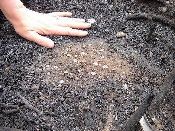| How knowledge influences a MCDM analysis: WOCAT Portuguese experience on prevention of forest fires |
 |
|
M. Carreiras (1), A.J.D. Ferreira (1), J. Moreira (1), T.C.J. Esteves (1), S. Valente (2), J. Soares (2), C.O.A. Coelho (2), G. Schwilch (3), and F. Bachmann (3) (1) Cernas, Escola Superior Agrária de Coimbra; Bencanta; 3040-316 Coimbra; Portugal, (2) Universidade Aveiro – CESAM - Campus Universitário de Santiago, 3810 – 193 Aveiro, Portugal, (3) Centre for Development and Environment (CDE), University of Bern, Hallerstrasse 10, 3012 Bern, Switzerland
Forest management is a major concern for land managers due to its impact on biomass production, surface water quality or landscape beauty. Pursuing the development of a holistic view of the issue (considering economic, environmental and social aspects), an appreciation of the variety policies and techniques is considered essential due to its importance in the context of sustainability. It this context, MCDM could be an important tool on the establishment for the use of the forest. It could be used for exploiting the preferences of decision-makers, stakeholders, or environmental experts obtaining economic values for impacts whose monetization remains problematic. WOCAT has developed a framework for Sustainable Land Management knowledge, covering all steps from data collection, database implementation and decision support. WOCAT methodology allows the environmental risks knowledge and also stakeholder’s participation and involvement. It leads to the discussion of issues of the territory and through a participatory, integrative, holistic and impartial process, it identifies environmental problems. In the end guidelines / actions for the territory are settled based on the problems identified. Having an active participatory nature, this process reveals itself as an excellent public participation process. The methodology also brings the territory’s decision-makers in contact with the stakeholders. The procedure for identification, assessment and selection of strategies has been developed by the EU project DESIRE in collaboration with WOCAT. The methodology was tested by DESIRE in 16 study sites around the world.
As an outcome of the procedure, the methodology may serve as a basis for prioritizing land-use policies, conservation measures and research at a national level. It integrates several exercises for prioritizing land-use policies, conservation measures and research at a regional and national level.
In Portugal, forest fires are one of the major factors of land degradation processes. Affecting large areas every year, they also have serious human, socio-economic and psychological impacts. Under the DESIRE project two Portuguese study sites were selected – Góis e Mação. Both study sites are located in Central Portugal and are frequently affected by forest fires. Nowadays different types of solutions applied at the local level are related with the prevention, combat and mitigation of forest fires. At a higher level of analysis the main solution is related with the diversification of the soil uses, mainly by the mixture of cropland, pastures and forest areas. But the selection of the technique isn’t so far an open, participative and effective process, and the interests of land users are not represented most of the time.
This paper aims to present WOCAT approach and results to forest fire prevention in Portugal considering stakeholder’s perspectives and policy recommendations and it’s evolution based on an increased of knowledge.
|

Acknowledgement
The DESIRE project was
|
DESIRE brought together the expertise of
26 international research institutes
and non-governmental organisations.
This website does not necessarily
represent the opinion of the
European Commission. The European
Commission is not responsible for
any use that might be made of the
information contained herein. 
